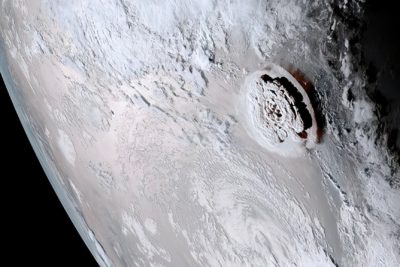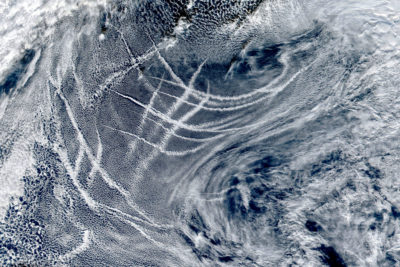About 18 months ago, climate scientists began noticing something strange. Starting in March 2023, global sea surface temperatures began to rise. Oceans are expected to get hotter in a warming world, but the rise was unusual as it occurred while the Pacific Ocean was in the neutral phase of a weather pattern known as El Niño-Southern Oscillation (ENSO). steep. In April 2023, sea surface temperatures set a new record. They did so again in May.
As months passed, the strange phenomenon continued. In the summer of 2023, the world entered El Niño, a warm period of ENSO. El Niño typically brings higher temperatures, but in the second half of 2023, both sea level and air temperatures rose so much that scientists were surprised. one called The figures are “absolutely ridiculously bananas.”
to essay appeared in nature “It is both humbling and slightly concerning to admit that no year has confounded climate scientists’ ability to forecast more than 2023,” NASA chief climate scientist Gavin Schmidt said in March.
Officially, El Niño ended in May 2024. However, global temperatures remain high. This year is expected to set another record.
Schmidt said scientists still cannot explain the unexpected rise in temperatures. When I spoke with him recently, he said the ongoing confusion was “a bit disconcerting” for researchers.
Scientists have identified several recent developments that may have been responsible for the anomalous warmth over the past year and a half. The first is a set of rules to reduce the sulfur content of fuel used in supertankers. Sulfur dioxide pollution reflects sunlight, so this change is good for public health, but could lead to increased ocean heating.
The second potential cause is an unusual explosion that occurred in January 2022. Typically, volcanoes release sulfur dioxide, creating temporary cooling. However, the eruption of Hunga Tonga-Hunga Ha’apai, an underwater volcano in the South Pacific, may have had a warming effect by spewing water vapor into the stratosphere.
Another possible contributor is the solar cycle. The sun is currently at or near peak activity, which can also cause temperatures to rise.
But Schmidt says that at this point, none of these developments, or even a combination of all of them, are enough to explain heat. This in turn raises several other possibilities. The recent rise in temperatures may be the result of some as yet unidentified development. Or it could mean that the climate system is more unpredictable than we thought. Or it could indicate that climate models are missing something or that feedbacks are amplifying faster than the models predicted.
I spoke with Schmidt, director of NASA’s Goddard Institute for Space Studies, via Zoom.
Gavin Schmidt.
NASA
Elizabeth Colbert: When did people like you start saying, “Okay, this is happening differently than I expected”?
Gavin Schmidt: Starting in the spring of 2023, we began to see things that raised eyebrows. Since all years are warm now, we expected 2023 to be another warm year, but probably not a record-breaking warm year. So when records started to break, first in the North Atlantic in March and April and June, then the global average in June, and then throughout the rest of the year, and then in the fall there were some truly absurd record-breaking events. It happened. — August, September, October, November — People started using adjectives that scientists don’t typically use.
To sum up 2023, it was a record-warm year and a record-breaking year. At this point our eyebrows were rolling over our heads. It was clear that all the predictions people had made at the beginning of the year were wrong. No matter what the method, they are all wrong, and they are all wrong by about 0.2 degrees Celsius. It may not sound like a big deal now, but it is a big problem.
There are two ways to accommodate missed predictions. You could even say that the actual prediction was wrong. Or we could say that we have underestimated uncertainty.
So in early 2024 we thought: I hope we can get more information about different things that are happening right now from people who study science. And maybe we’ll get more analysis of internal volatility. Some of that has happened, but not in a coordinated way. And in terms of assessing what actually happened in 2023, I would say it’s still amateur time.
Colbert: There was a whole list of things people thought contributed.
Schmidt: right. One was a rule change by the International Maritime Organization that went into effect in January 2020 to clean up fuel used in shipping..
“Things are progressing in a more erratic way than we expected, which means future predictions may also be further off.”
Another event was the eruption of the Hunga Tonga-Hunga Ha’apai volcano in the South Pacific, a very unusual explosion. Large amounts of water vapor enter the normally very dry stratosphere. It was a very new thing and people were saying, ‘Well, maybe that might contribute.’
People were also talking about the unusual behavior of Saharan dust or wind patterns in the North Atlantic. People were talking about long-term, ongoing changes in how much pollution is occurring in China and India. Maybe things are changing faster than we expected. Pollution in the air is a cooling factor, so removing it makes it a warming factor.
The science that has been accomplished so far has not been spread evenly among them all. Many of you have looked at the impact of changes to maritime shipping regulations. If we apply this to a climate model and estimate the temperature change, we can currently expect it to be around 0.05 or 0.08 degrees. [of warming per year], It then increases by about 0.1 degrees over 10 years. So it seems helpful, but not enough. And in the first paper that came out about volcanoes, they said, “No, no, the normal cooling volcanic contamination is still greater than the warming water vapor component.” Now there’s more to explain and less to explain.
We are still waiting for China’s emissions assessment. We don’t know what’s happening with the pollution.

The eruption of the underwater Hunga Tonga-Hunga Ha’apai volcano in January 2022 produced water vapor that may have a warming effect.
NOAA
Colbert: Is it because there is no way to collect data?
Schmidt: Now all prediction systems are using outdated input files. And some of them have a lot of them.
Colbert: [In March you wrote in Nature] “A warming planet is already fundamentally changing the way the climate system works, much faster than scientists expected.” What does that mean? And now, six months later, what do you think about it?
Schmidt: As I said, there are two reasons for messing up your predictions. One is that the driving element is missing. Another is that you are underestimating the spread. Things are behaving in a more erratic way than we expected, which means future predictions may also be more off. And you may think that things are getting weirder in many ways because the system is changing in a way that what happened in the past is no longer a good guide to what will happen in the future. And that’s concerning. For example, we have huge industries and great expectations based on temperature anomalies related to: [El Niño].
So if we predict [El Niño] Then Africans begin to plant a variety of crops. Indonesians begin to prepare for the dry season. If the connections between the rest of the world and what is happening in the tropical Pacific are changing, any previous practices or recommendations based on past relationships may no longer be good. And if that is now the new standard, then there is no new standard.
“The biggest uncertainty that will determine whether 2100 will be a happy or less happy place is our decisions about emissions.”
But if the volcano’s power was a little greater than we thought, everything that came before is still fine, and history is fine, too. We only need to fix that one volcano. Right? But we haven’t really identified the problem yet, which is somewhat frustrating for the community.
Colbert: How do I fix this?
Schmidt: These input data sets need to be updated.
We have 15 to 20 modeling groups ready to look at exactly the questions we think everyone will be interested in. And we’re twiddling our thumbs. Where is the data?
Colbert: I would be very concerned if things progressed faster than expected.
Schmidt: that. There are real decisions to be made, and we are providing people with information that is valid from the last IPCC report in 2020. And in most cases, that’s probably okay. But if you have a process, you will feel much more confident. This is a place that updates things like this, if not every day, maybe once a year.
Colbert: What do laypeople need to know?
Schmidt: We are on track to reach 1.5 degrees a little faster than expected four years ago. I think it’s about 50-50 whether temperatures will reach 1.5 degrees this year. [NASA Goddard Institute for Space Studies] Temperature log.

A satellite view of the ship’s route in the North Pacific. New restrictions on pollution will reduce trails, which will have a cooling effect.
NASA
Colbert: I know people like you don’t like answering questions like this, but I’ll ask anyway. Because you’re sitting at home and the photo is probably taken by your daughter behind you. Of the data you’ve looked at over the past year and a half, what concerns you the most as a father?
Schmidt: My daughter was born in 2015, which means she could live until 2100. So the predictions we make will help your daughter know how everything plays out.
We are looking at very, very small amounts of tea leaves to predict the future. What happened this month? What happened last month? What happened in the Sahara? What was happening in Antarctica?
But the biggest uncertainty that will determine whether 2100 will be a happier or less happy place is our decisions about emissions. And they reduce the uncertainty we’re talking about here. We’re talking about 0.1 degrees, 0.2 degrees. Well, the differences in emission are 1st, 2nd, and 3rd degrees. So it’s much bigger. And when we take into account the non-linearity of the impact, the amount of impact we will see becomes much larger.
Things move faster [than anticipated] It may encourage people to behave more aggressively, or it may mean that once we reach 1.5 degrees, people will stop bothering us. It’s very difficult to predict. I have a feeling that what we’re doing will affect these decisions, but I don’t know how it will affect these decisions. So my best plan is to do the best I can on the science side and hope that knowing more about the system will help people make better choices. But obviously that is hopelessly naive.
Colbert: People must cling to what they have.
Schmidt: I mean, if you really felt that people would make better decisions without information, you wouldn’t be a journalist. I wouldn’t be a scientist. We will not believe in democracy.
This interview has been edited for length and clarity.






